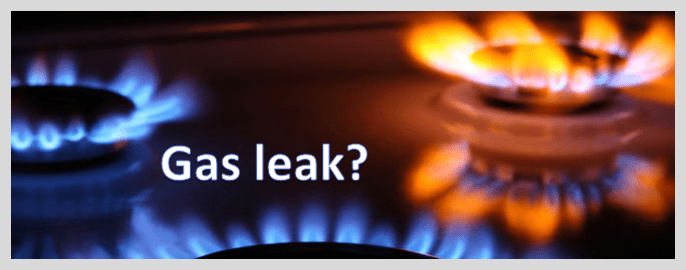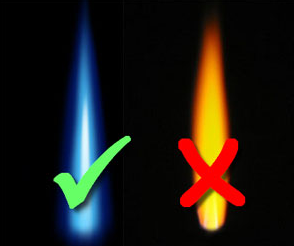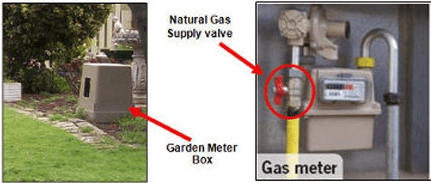How do you know if you have a gas leak? 7 Tips from your local gas fitter Brisbane
LPG (propane or butane) is very popular in homes and businesses as a source of energy to many appliances. This is understandable because it is usually very efficient, reliable and cleaner compared to other fossil fuels. However, when there is a gas leak it can pose a serious risk to your health and safety, but how do you know if you have a gas leak?
This article will give you 7 tips on how to detect a gas leak and what to do next. This article will also offer some advice on where to find the isolation valve to switch the gas off and what you can do to prevent gas leakages in the future.
7 ways to detect a gas Leak
1. Your gas appliance keeps running out too quickly
Nobody likes it when you are in the middle of cooking on a gas stovetop and all of a sudden your gas stovetop stops working. Especially when you just replaced the gas not too long ago. This not only applies to the kitchen stovetop but other gas appliances such as ovens, water heaters and indoor heaters as well as other gas appliances. If you feel that your gas is running out much more quickly than usual, it may be due to a gas leak.
2. You can smell a sulphur like scent
A strong indication of a gas leak is that you smell a faint to strong sulphur like scent. If you don’t know what sulphur smells like, it is an unpleasant scent similar to eggs that have gone off or decomposing cabbage. The reason for this smell is not due to the natural gas itself because LPG (Butane or Propane) by itself has no scent and this makes it difficult to detect dangerous gas leaks. Therefore gas companies have added ethyl mercaptan to the LPG as a safety measure to give off a sulphur like scent in order to better detect gas leaks. So if you smell this persistent scent in your home and you are concerned that you have a gas leak, it is very important that you locate the isolation valve which switches off the gas and call a gas plumber straight away. If you do not know what an isolation valve looks like or where it might be located, read the ‘Where to find the gas isolation valve’ section of this article.
3. Check the flame colour of your gas appliance
If you want to know how to check for a gas leak on stove or any other gas appliances, look at the colour of the flame.
A normal gas flame should be mostly blue in colour, if the flame is mostly orange or yellow colour it may indicate a gas leakage. If you can see that the flame is orange or yellow rather than mostly blue, switch off the flame and do not use the gas appliance until it has been checked and repaired by a professional gas fitter. Again, locate the isolation valve to switch off the gas as safety precaution.
4. You hear can hear a hissing sound
If you can hear a hissing sound near your gas appliance, this can be an indication that the gas is escaping and thereby creating a sound similar to a what you hear when you release air out of a tyre.
5. Do a bubble test
If you think you know where the gas leak might be coming from, you can try testing for gas leaks with soapy water. Here are the steps.
1. First, get a sponge and soak the sponge in some water and dishwashing detergent or handwash.
2. Then use the sponge to wipe over the area where you think the leak might be coming from.
3. If it starts to form bubbles then it indicates a gas leak.
If you are not sure where the gas leak may be coming from, just keep a lookout for bubbles in moist areas of your home as this could indicate a gas leak from under the ground.
If you still can’t detect the leak, call your local gas plumber to locate the leak and fix the issue.
6. Dead plants and insects
If your plants are dying with no apparent cause, it could be due to a gas leak nearby the plants. Similarly, if there are dead insects such as spiders inside your gas meter box, it could also indicate a gas leak.
7. You feel queasy indoors
When you breathe in gas, carbon monoxide replaces oxygen in blood cells and when there is a decrease in oxygen in your body you can begin to feel queasy. The lack of oxygen may give you symptoms such as nausea, vomiting, dizziness, headaches, disorientation, blurred vision, drowsiness or shortness of breath.
What do you do if you have a gas leak?
If you have a gas leak, do not switch on any lights or electrical equipment as gas is highly flammable and a spark might start a fire. It is very important that you locate the isolation valve which switches off the gas and to call a gas plumber straight away. If you think there is a gas leak inside the house, after you switch off the gas, open the windows and doors to let more oxygen in the house while you wait for a plumber. If you experience severe health symptoms such as shortness of breath or blurred vision, then seek medical attention.
For a measure of precaution for future instances you can install gas detectors which sound an alarm upon the detection of gas. This is very useful especially if you do not have a strong sense of smell. It would also be useful to familiarise yourself with where the isolation valve might be and advise others to do the same.
Where to find the gas isolation valve:
The isolation valve for gas meters are usually mounted on a wall, sometimes close to the electrical meter box or it could be located in a plastic box in the front yard of your house, usually close to the boundary of the property. To switch off the valve, turn the lever so that it is not aligned with the pipes and on a 90 degree angle to the pipe.
How do I prevent gas leakages?
The main tip to try to avoid gas leakages is to maintain your pipes regularly and ensure that you use plumbers who carry out quality workmanship. This is key because not every plumber is licensed or qualified to carry out gas work and therefore unskilled plumbers might carry out poor gas work leading to a higher risk of gas leakages.
If you need a gas plumber Brisbane or gas fitter Brisbane and want to be certain of using high quality as well as certified gas plumbers or gas fitters Brisbane, call Soul Plumbing on 0432 715 132. We are experts in gas plumbing, gas fitting and gas installation Brisbane. And we hold the required qualifications, skills and experience to do the job right.
Contact your local gas plumber Brisbane and you can rest assured that we will do the job with upmost precision and quality, thereby preventing your home or business from future gas leakages.
We hope that this article has been helpful with answering the question how do you know if you have a gas leak. If you need a gas fitter Brisbane, then call us at Soul Plumbing on 0432 715 132 and we will attend to any of your gas fitting needs.




